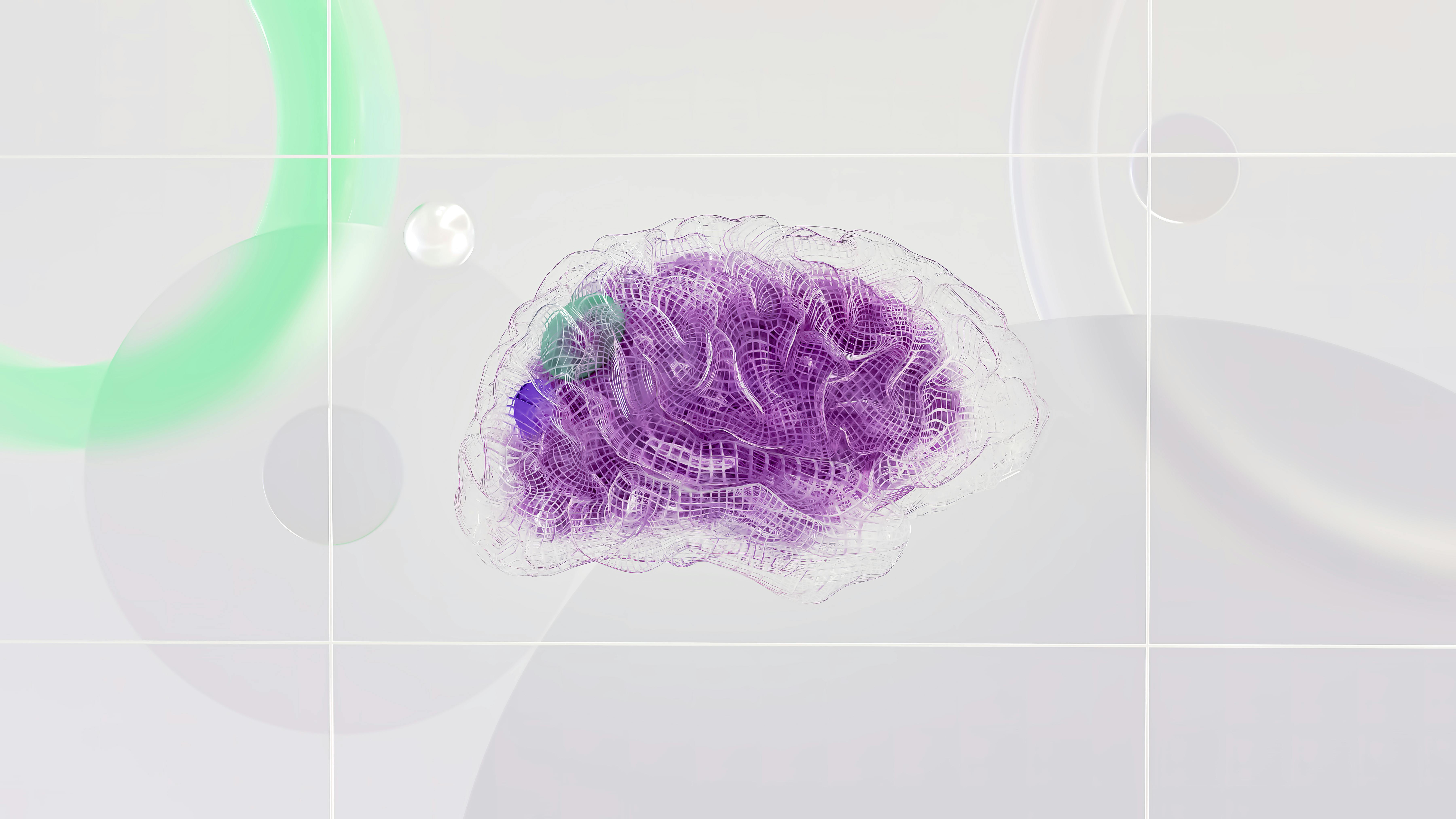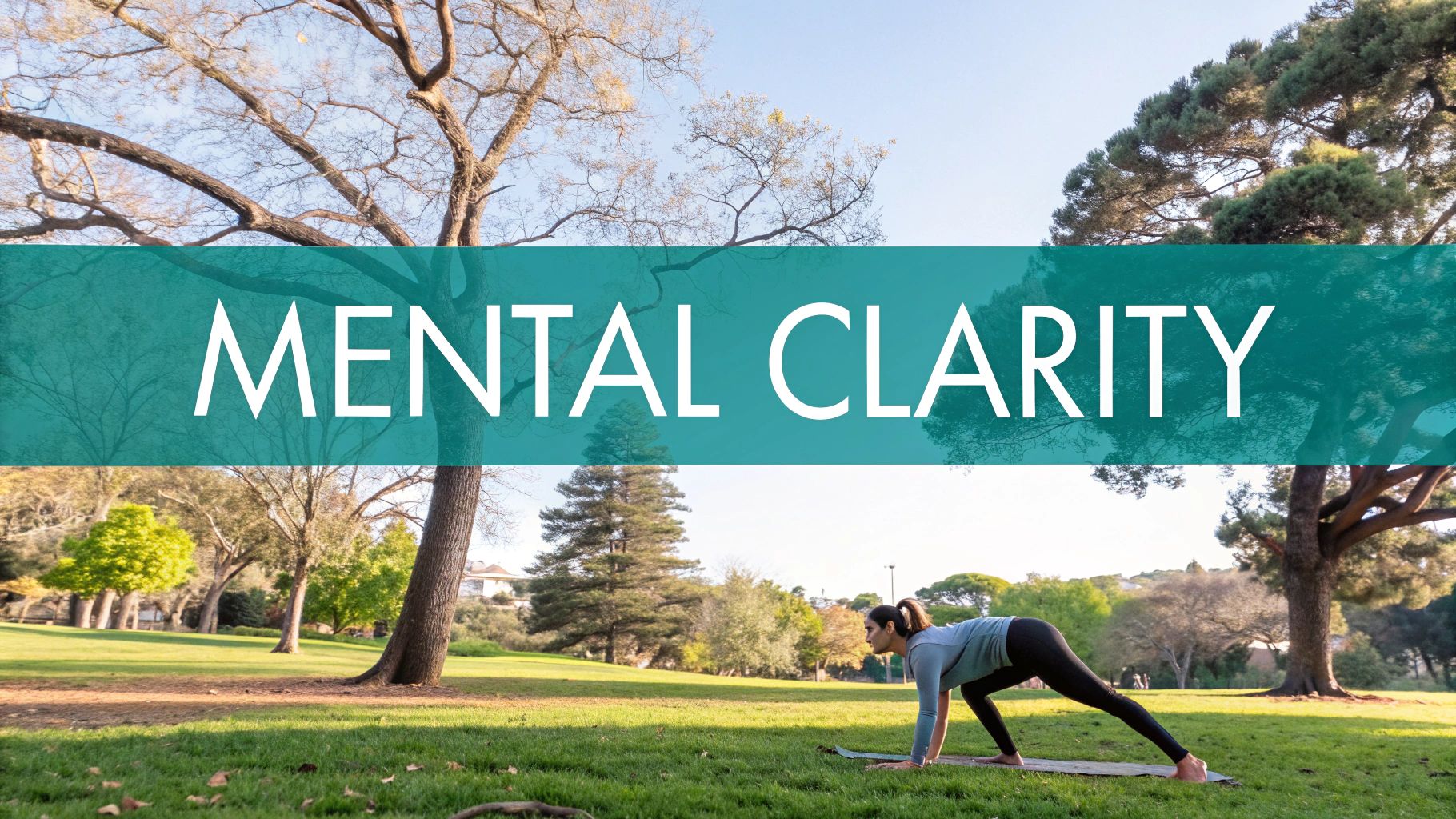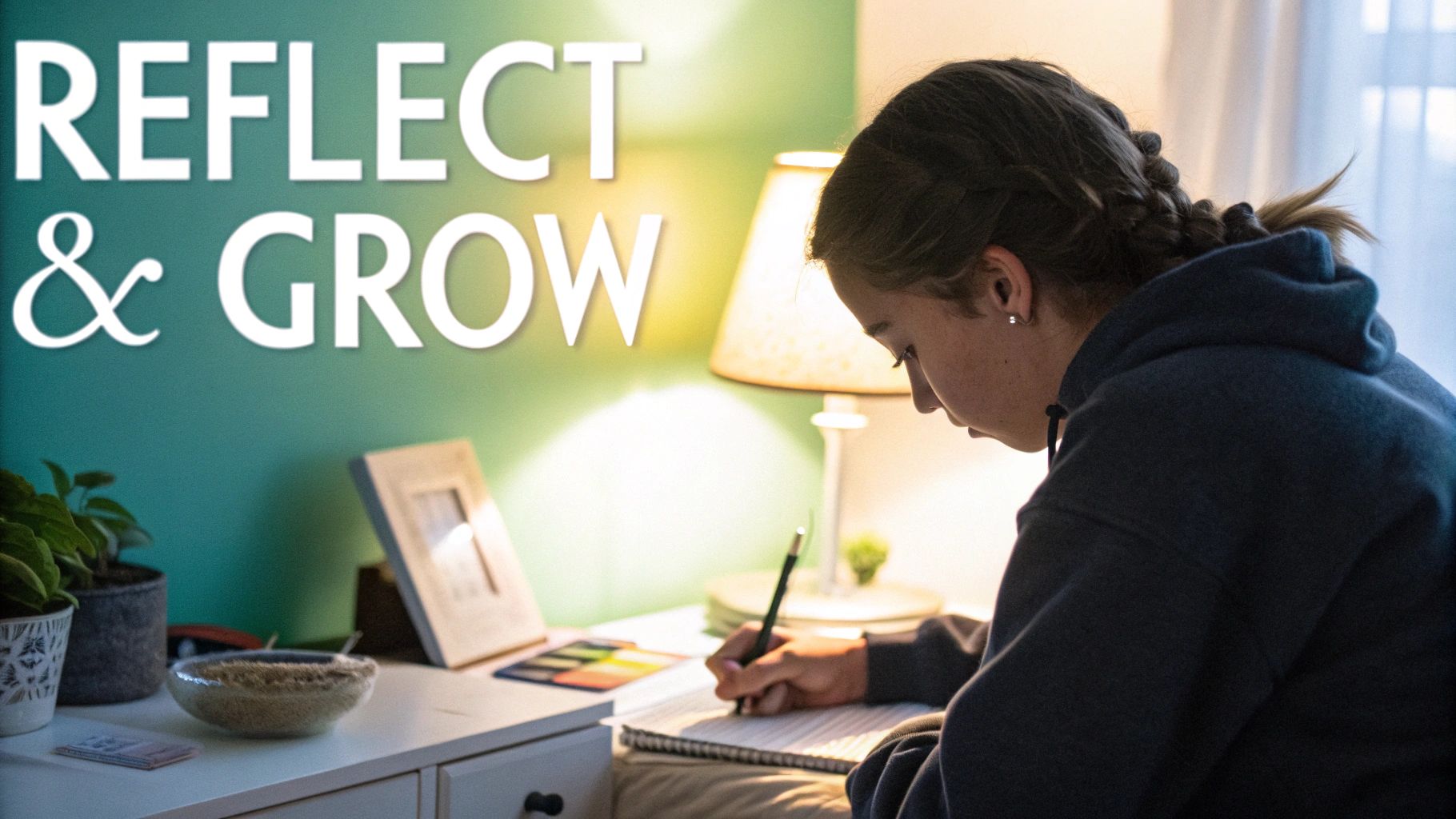
Understanding Your Brain’s Incredible Power to Change
We used to think our brains became fixed after childhood. Many believed brain damage was permanent and learning got harder as we aged. But an amazing discovery called neuroplasticity has completely changed this view. Science now shows that your brain can create new connections and pathways throughout your entire life. This means you have boundless potential for growth, regardless of your past. You might be interested in: How to master your mindset.
Rewiring: A Continuous Process
Your brain is constantly forming new neural connections through a process called neuroplasticity. Think of it like a living sculpture that gets reshaped by your daily experiences, new knowledge, and even injuries. When you pick up a new skill, like learning Spanish or playing guitar, your brain physically creates new pathways. This natural ability helps us learn, grow, and bounce back from challenges at any age.
Evidence of Adaptability
Scientists have found fascinating proof of the brain’s flexibility. In one key study, researchers explored how young animals’ brains adapted when one eye was temporarily covered. The brain regions normally used by the covered eye quickly began working with the open eye instead. Advanced microscope studies have confirmed these dramatic neural changes. Learn more about this research here: Caught in the Act: Study Catches Brain Circuits as They Rewire. Even adult brains show remarkable changes through learning and practice. Your brain’s adaptability means you can actively shape your mind’s abilities. This knowledge empowers you to build positive habits, break unwanted patterns, and reach your full potential through dedicated practice and learning.
The Power of Mental Training
The mind holds incredible abilities to create change without physical action. Mental practice – including visualization and mental rehearsal – can reshape our brains just as effectively as physical practice. A groundbreaking study by Dr. Alvaro Pascual-Leone showed this clearly: piano students who only practiced mentally developed the same brain changes as those who practiced physically. Their motor cortex areas expanded significantly in both groups. Read the full research findings.
Proven Mental Training Methods
Top performers across many fields use mental training to excel. Here are effective ways to bring these practices into your own life:
- Clear Visualization: See yourself performing actions perfectly in your mind. This strengthens brain pathways just like physical practice.
- Daily Mental Rehearsal: Practice specific skills in your mind consistently to build stronger neural connections.
- Present-Moment Focus: Stay fully aware during practice to maximize the benefits for your brain.
Starting these practices becomes easier when you understand how they help rewire your brain and boost your abilities.
How Mental Practice Changes Your Brain
Mental practice creates real changes in the brain through neuroplasticity – your brain’s natural ability to form new connections and adapt. When you visualize an action, your brain activates similar pathways to when you physically do it. Research shows that imagined practice can be nearly as effective as real practice for improving both brain function and muscle control. You can track your progress by noting improvements in both mental clarity and physical performance.
The beauty of mental practice lies in its simplicity and power. By taking time to visualize and mentally rehearse your goals, you actively reshape your brain’s structure. This makes mental practice a key tool for rewiring your brain and achieving success in any area of life. The line between thought and action becomes wonderfully blurred, showing us that focused mental effort can create real-world results.
Transforming Your Brain Through Strategic Learning

By taking a strategic approach to learning, you can literally reshape your brain. Scientific research shows how focused learning creates physical changes in brain structure. A fascinating example comes from studies of London taxi drivers – their intensive map memorization work led to measurable increases in brain volume, specifically in areas related to spatial memory. You can read more about this remarkable discovery here: Learn more about the changes observed in London taxi drivers.
Techniques to Optimize Learning
Top memory performers and brain experts rely on these proven methods to boost learning:
- Spaced Repetition: Review information at carefully timed intervals to lock it into long-term memory
- Active Recall: Quiz yourself instead of re-reading – this builds stronger memory pathways
- Visualization: Create vivid mental images to make abstract concepts stick
When used together, these methods help your brain form stronger neural connections for better learning.
Structuring Your Learning for Success
To get the most out of learning anything new:
- Set Clear Goals: Know exactly what you want to achieve
- Mix Learning Methods: Combine reading, listening and hands-on practice
- Use Feedback: Regularly check your progress and adjust your approach
This structured approach taps into your brain’s natural learning abilities for the best results.
Creating clear frameworks for your learning projects leads to better outcomes. The science shows that strategic learning creates real changes in how your brain works and grows.
For more tips on maximizing your learning potential, check out our guide on How to master….
Remember – strategic learning doesn’t just fill your mind with information. It physically strengthens your brain’s ability to learn, grow and adapt, setting you up for lifelong growth and achievement.
Building Professional Expertise Through Brain Development
The connection between career growth and focused brain training offers exciting possibilities. When we understand how different professions actually change our brain’s structure and function, we can deliberately shape our mental capabilities to excel in our chosen fields. By harnessing our brain’s natural ability to adapt and grow, we can accelerate our path to professional mastery.
How Your Profession Shapes Your Brain
Each profession exercises different parts of our brain in unique ways. A musician refines their auditory processing and precise finger movements, while a software engineer strengthens their logical thinking and problem-solving abilities. These daily work activities naturally train and reshape our brain through a process called occupational neuroplasticity – our brain’s ability to adapt based on the skills we practice.
Scientific research strongly supports this link between expertise and brain changes. A comprehensive analysis of 26 brain imaging studies and 17 structural studies revealed clear differences between experts and beginners. Expert brains showed greater development in key areas like the right putamen and superior temporal gyrus, which handle essential skills like movement control and sound processing. Learn more about brain changes in experts.
Practical Strategies for Brain-Based Professional Growth
You can speed up your professional development by training your brain effectively. Here are proven approaches:
- Targeted Mental Practice: Picture yourself successfully completing important tasks, giving presentations, or handling negotiations. This mental rehearsal builds skill-related neural pathways even without physical practice.
- Skill-Specific Training: Focus on building the core abilities needed in your field through dedicated courses, workshops, and deliberate practice.
- Feedback and Reflection: Get regular input on your performance and use it to improve. Think about what worked well and what needs work to strengthen positive brain changes.
Measuring Your Progress
Track your growth to ensure your brain training is paying off. Here’s how:
- Performance Metrics: Look at concrete measures like sales numbers, completed projects, or client satisfaction to see your improvement.
- Skill Assessments: Test your abilities regularly through evaluations, practice scenarios, or peer reviews to measure your brain training results.
- Self-Reflection: Keep tabs on your work habits, thinking patterns, and decision-making. Notice positive shifts in how efficiently you work, solve problems, or come up with new ideas.
By following these methods and carefully monitoring your progress, you can use your brain’s adaptability to build true professional excellence and reach higher levels of career success.
Creating Daily Habits That Transform Your Brain

Your daily actions shape who you become. By building purposeful habits, you can actually rewire your brain and boost its natural ability to adapt and grow. The key is making small, consistent changes that add up to major improvements over time.
Science-Backed Activities for Brain Change
Research shows these daily practices can significantly enhance your brain’s ability to form new connections:
- Regular Exercise: Moving your body increases blood flow to the brain, helping create new brain cells and improving memory. Studies published in the Journal of Neuroscience found that consistent aerobic activity led to measurable growth in the hippocampus – the brain’s memory center.
- Mental Workouts: Challenge yourself with puzzles, learn a new skill, or play strategy games. Just like exercising a muscle, giving your brain new challenges helps it build strength and resilience.
- Daily Mindfulness: Taking time to meditate and practice mindfulness creates measurable changes in brain structure. Brain scans reveal thicker regions related to focus and processing in people who meditate regularly.
Real-World Examples of Brain-Boosting Routines
Many high achievers make brain health a priority in their daily schedule. Take Elon Musk, who dedicates time each day to reading and learning something new. You can build brain-friendly habits by linking them to existing routines – like doing a quick meditation after your morning workout or reading while having coffee.
Simple Steps to Build Better Brain Habits
Here’s how to create habits that stick and support your brain health:
- Start Tiny: Begin with just 5 minutes of your chosen activity each day. Small wins build momentum.
- Set Prompts: Use phone alerts or link habits to daily activities as natural reminders.
- Monitor Growth: Keep a simple record of your progress to stay motivated and see how far you’ve come.
When you commit to these proven practices, you build a strong foundation for lifelong brain health and mental flexibility. For more guidance on creating lasting habits, check out: How to master habit formation and integration.
By taking small, steady steps toward better brain habits, you invest in a sharper, more adaptable mind for years to come.
Tracking Your Progress and Securing Lasting Change

Creating real change in your brain is about more than just building new habits – it’s about mindfully observing your progress and strengthening positive developments. By combining careful observation with honest self-reflection, you can turn short-term improvements into lasting transformation.
Measuring Cognitive Improvements
There are many ways to track your brain’s growth and development. The key is finding methods that resonate with you personally while providing clear insights into your progress.
- Digital Tools: Brain training apps and platforms offer objective ways to measure improvements in memory, focus, and mental processing. These tools give you solid data to see your growth.
- Journaling: Writing about your thoughts, emotions, and behaviors provides rich insights into your changing mindset. A journal reveals subtle but important shifts in how you think and feel.
- Performance Tracking: When working on specific skills like music or language learning, measure concrete progress through timed practice sessions, recordings, or feedback from teachers.
- Self-Check-ins: Regular reflection on your emotional state, reactions to challenges, and thought patterns gives you valuable awareness. These personal assessments help spot both wins and areas needing work.
Overcoming Roadblocks and Ensuring Lasting Change
Growth rarely follows a straight line. Building resilience and flexibility helps you stay on track when facing obstacles.
- Know Your Triggers: Learn what situations, thoughts or feelings lead to unwanted responses. For example, if you’re working through anxiety, notice exactly what tends to spark those worried feelings.
- Build Your Toolkit: Gather practical techniques like deep breathing, mindfulness practices, or positive self-talk to handle tough moments effectively.
- Stay Flexible: Be ready to try new approaches if your current methods aren’t getting results. This might mean exploring different learning styles or finding fresh ways to relax and recharge.
- Celebrate Progress: Take time to acknowledge every step forward, no matter how small. Recognizing your wins reinforces positive changes and builds momentum.
By staying aware of your progress, meeting challenges head-on, and adjusting your approach when needed, you create changes that truly stick.
Ready to discover new ways to grow and transform? Mind Love, hosted by Melissa Monte, offers rich insights and practical tools for rewiring your mind and creating positive change. Their resources can help you break old patterns and build the life you want.



